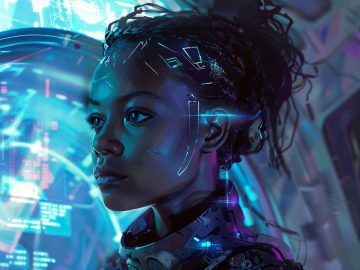On July 21, US President Joe Biden officially announced his decision to withdraw from the 2024 presidential race amid growing pressure from within the Democratic Party. Biden stated that stepping down was in the best interest of the party and the nation, and he endorsed Vice President Kamala Harris as his successor.
This move introduces new uncertainties into the 2024 election, in which AI regulations and semiconductors have become heavily debated topics for the political battleground.
AI regulations did not fall out of the coconut tree
Notably, if Harris emerges as the official Democratic nominee, her stance on AI regulation will be a focal point. Unlike Biden, Harris has been more outspoken about the need for regulations to address potential AI risks, including deepfakes, algorithmic bias, and misinformation.
Her approach to AI regulation and its impact on semiconductor supply chains will be closely watched.
According to Bloomberg, Biden’s decision to withdraw is aimed at uniting the Democratic Party to defeat former President Donald Trump. In a statement on July 21, Harris expressed her intention to secure the nomination writing, “my intention is to earn and win this nomination” on social media platform X (formerly Twitter).
The Democratic Party has yet to finalize a replacement for Biden, but Harris is a leading contender, receiving support from former President Bill Clinton and Presidential nominee Hillary Clinton.
Born in Oakland, California, Harris has long been associated with the tech industry. She served as a San Francisco District Attorney and California Attorney General. She was subsequently elected to the US Senate in 2016.
As Vice President, Harris has been clear about the need for stronger AI regulations. At the AI Safety Summit in the UK in November 2023, she remarked, “As history has shown, in the absence of regulation and strong government oversight, some technology companies choose to prioritize profit over the well-being of their customers, the safety of our communities, and the stability of our democracies.”
Politico reported that during early discussions on AI policy in July 2023, Harris emphasized that there should be no “false choice” between fostering innovation and protecting the public.
In contrast, Biden has primarily advocated for self-regulation by AI companies. In October 2023, he issued a broad executive order on AI, which has faced criticism from Republicans who argue that it imposes excessive regulatory burdens on tech firms.
Trump: foe or friend to tech?
Venture capitalists Marc Andreessen and Ben Horowitz have expressed concerns that the Biden administration’s approach could stifle innovation, citing that as one of the reasons they are supporting Trump this election cycle.
The Washington Post reported that Trump, during a podcast, mentioned he had heard from Silicon Valley “geniuses” about the need for more energy to fuel AI development in competition with China. Trump’s allies are also preparing an executive order that would initiate a series of “Manhattan Projects” to advance military technology and review existing regulations deemed unnecessary.
The GOP platform launched leading up to the Republican National Convention, includes plans to repeal Biden’s AI executive order. Tech investors and startups have criticized this order as a hindrance to innovation.
Prominent figures in Silicon Valley, such as Tesla CEO Elon Musk and hedge fund manager Bill Ackman, have thrown their support behind Trump, suggesting that a second Trump administration might have a more favorable stance toward the tech industry.
In response to these proposed policies, the Trump campaign has stated that no future presidential staffing or policy announcements should be considered official unless directly issued by Trump or an authorized campaign member.
Trump’s recent comments criticizing Taiwanese semiconductor companies for allegedly diverting business from the US and demanding protection fees have cast a shadow over future US-Taiwan semiconductor collaboration. Taiwan-made chips, led by TSMC, are crucial to the AI hardware ecosystem.
The potential impact of these comments and the November US presidential race on global AI development and supply chains remains to be seen.




